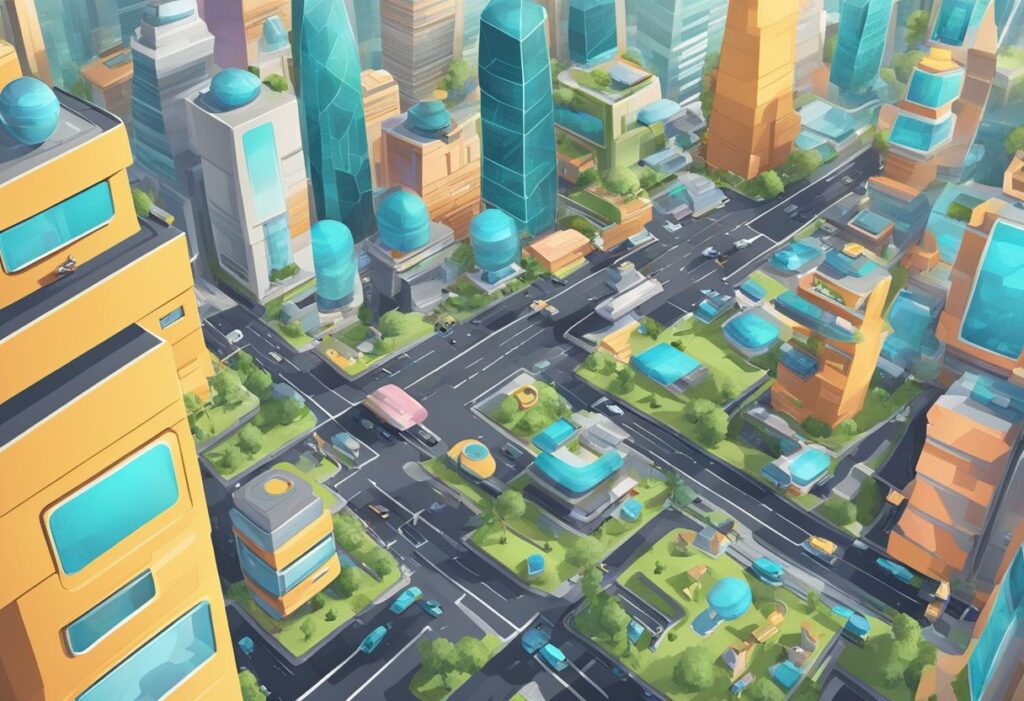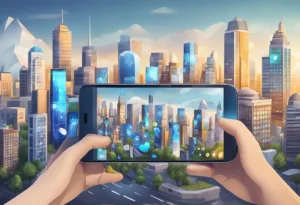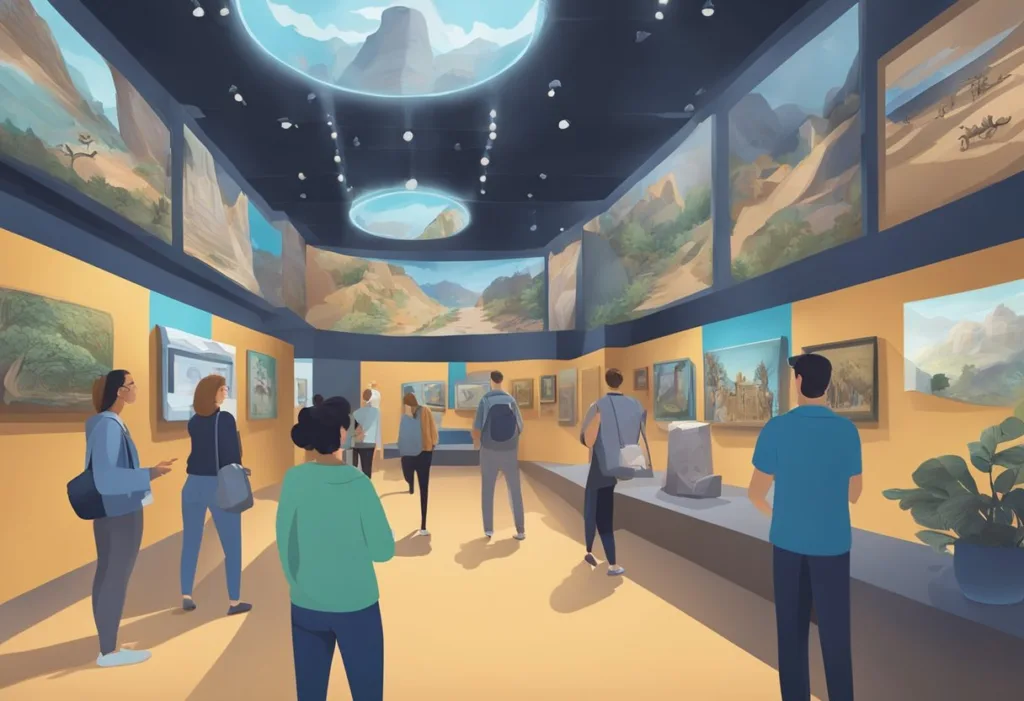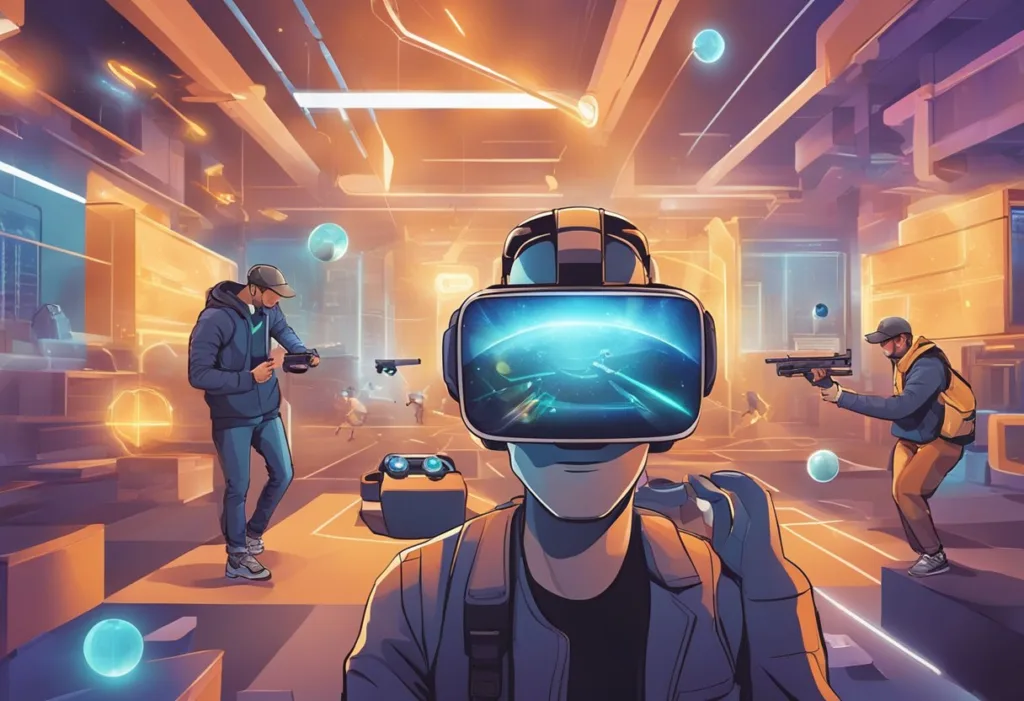The concept of a metaverse has been around for decades, but with the rapid development of virtual reality and augmented reality technologies, it is becoming increasingly relevant. The metaverse is essentially a virtual world that is shared by many users, allowing them to interact with each other and with digital objects in a variety of ways. Some experts believe that the metaverse could eventually become a new form of the internet, offering a more immersive and interactive experience than the current web.
While the concept of a metaverse may seem like science fiction, it is already starting to take shape. Many video games and virtual reality experiences offer glimpses of what a metaverse could look like, and companies like Facebook and Google are investing heavily in the development of this technology. In the future, it is possible that we will be able to work, socialize, and even shop in the metaverse, creating a whole new world of possibilities. However, there are also concerns about privacy, security, and the potential for addiction and other negative effects. As the metaverse continues to develop, it will be important to consider these issues carefully.
Defining the Metaverse
The concept of the Metaverse has been around for decades, but it has gained renewed attention in recent years due to advancements in virtual reality and other immersive technologies. The Metaverse is a term that refers to a shared virtual space where users can interact with each other and digital objects in real-time. It is a virtual reality that offers an immersive experience beyond traditional video games or social media platforms.
Historical Context
The term “Metaverse” was first introduced in Neal Stephenson’s science fiction novel Snow Crash, published in 1992. In the book, the Metaverse is a virtual reality that people can access through a computer network. It was envisioned as a place where people could interact with each other and digital objects in a shared space.
Since then, the concept of the Metaverse has been explored in various forms of media, including movies, TV shows, and video games. One of the most popular depictions of the Metaverse is in the novel Ready Player One by Ernest Cline, which was later adapted into a movie directed by Steven Spielberg.
Modern Interpretations
Today, the Metaverse is seen as a potential next step in the evolution of the internet. It is envisioned as a shared virtual space that is accessible from anywhere in the world and can be used for a variety of purposes, from gaming to socializing to virtual commerce.
Companies like Facebook, Microsoft, and Google are investing heavily in the development of the Metaverse, with the goal of creating a fully immersive virtual space that can be accessed by anyone with an internet connection.
The Metaverse is still in its early stages of development, and there are many questions about how it will be regulated, monetized, and used. However, it is clear that the Metaverse has the potential to revolutionize the way we interact with each other and with digital content.
Technological Foundations
The metaverse is built on a foundation of advanced technologies that enable immersive, persistent, and interconnected virtual experiences. Here are some of the key technological building blocks of the metaverse:
Virtual and Augmented Reality
Virtual and augmented reality (VR and AR) are essential components of the metaverse, providing users with immersive, interactive, and lifelike experiences.
VR technology enables users to enter a fully immersive virtual environment, while AR overlays digital content on the real world. Unity and NVIDIA are two companies that are leading the way in developing VR and AR technologies that are essential for the metaverse.
Blockchain Technology
Blockchain technology is another critical component of the metaverse, providing a secure and decentralized platform for transactions and interactions.
Blockchain technology enables the creation of digital assets that can be owned, traded, and used within virtual environments. Companies like Ethereum and Decentraland are leveraging blockchain technology to create decentralized virtual worlds that are a fundamental part of the metaverse.
Artificial Intelligence
Artificial intelligence (AI) is another key technology that is driving the development of the metaverse. AI can be used to create intelligent virtual agents that can interact with users and provide personalized experiences.
AI can also be used to generate realistic environments and objects, making the metaverse feel more like a real-world experience. Companies like NVIDIA and Unity are leveraging AI to create more realistic and immersive virtual environments.
Cloud Computing
Cloud computing is the backbone of the metaverse, providing the computing power and storage needed to support the vast amounts of data and processing required for immersive virtual experiences. Cloud computing enables users to access virtual environments from anywhere, at any time, on any device.
Companies like Amazon Web Services and Microsoft Azure are leading providers of cloud computing services that are essential for the metaverse.
The metaverse is built on a foundation of advanced technologies that enable immersive, persistent, and interconnected virtual experiences. VR and AR, blockchain technology, AI, and cloud computing are all critical components of the metaverse, providing the building blocks for the creation of virtual worlds that are more immersive, interactive, and lifelike than ever before.
Metaverse Experiences
The Metaverse is a shared, immersive, persistent, 3D virtual space where humans experience life in ways they could not in the physical world. It offers a wide range of experiences that can be categorized into gaming and entertainment, virtual social spaces, educational and work environments.
Gaming and Entertainment
The Metaverse offers a unique gaming experience that allows players to immerse themselves in a virtual world. Players can interact with the environment and other players in real-time, allowing for a more social and engaging gaming experience. The Metaverse also offers a wide range of entertainment options, such as virtual concerts, festivals, and movie screenings.
Virtual Social Spaces
The Metaverse provides a platform for social interaction that goes beyond traditional social media. Users can create avatars and interact with other users in virtual spaces, allowing for a more immersive and personalized social experience. The Metaverse also offers the opportunity to attend virtual events and meet new people from all over the world.
Educational and Work Environments
The Metaverse has the potential to revolutionize education and work environments. It offers a more immersive and engaging learning experience, allowing students to interact with educational content in a more dynamic way. The Metaverse also provides a platform for remote work, allowing employees to collaborate and work together in a virtual environment.
The Metaverse offers a wide range of experiences that cater to different interests and needs. It has the potential to revolutionize the way we interact with each other, work, and learn. With the rise of VR headsets and other technologies, the Metaverse is becoming more accessible and is expected to grow in popularity in the coming years.
Economic Aspects
The metaverse is a virtual world that is built upon immersive technologies and mixed reality, which is set to unlock significant economic value across the world.
Digital Assets and Cryptocurrencies
The metaverse economy refers to the real value that has been placed upon virtual assets, motivated by the illusion of digital scarcity. It has created a new market for digital assets, including cryptocurrencies, which are used as a medium of exchange in the metaverse. The use of cryptocurrency has enabled users to buy and sell digital assets, including non-fungible tokens (NFTs), which are unique digital assets that are verified on a blockchain.
Virtual Real Estate
Virtual real estate is another economic aspect of the metaverse. The virtual real estate market is growing, and it is expected to continue to grow in the future. Investors can buy and sell virtual land, buildings, and other assets in the metaverse, just like in the real world. The value of virtual real estate is determined by the location, size, and popularity of the property.
Investment and Growth
The metaverse has created new types of businesses, new employment opportunities, and has opened up new ways of working. The metaverse continues to hold significant promise for driving creativity and economic opportunity around the world.
Investors can invest in the metaverse and its associated technologies, which can lead to significant growth opportunities. The metaverse has the potential to become a multibillion-dollar industry, and it is expected to continue to grow in the future.
The metaverse is an emerging collection of three-dimensional virtual worlds that have significant economic potential. The use of digital assets, virtual real estate, and investment opportunities are driving the growth of the metaverse economy. The metaverse has the potential to become a significant economic force in the future.
Social and Cultural Impact
The metaverse is set to revolutionize social and cultural norms, creating a new frontier for social connection and cultural phenomena. This section will explore the various ways the metaverse is set to impact society.
Virtual Identity and Avatars
One of the most significant impacts of the metaverse is the ability to create a digital avatar, which can be customized to look and behave like the user.
The avatar allows users to interact with the metaverse, creating a new form of social connection that is not limited by physical space or time. The avatar also provides users with a new form of identity, allowing them to explore new aspects of their personality or experiment with different forms of self-expression.
Community and Governance
The metaverse is also set to impact the way communities are formed and governed. With the ability to create virtual spaces, users can form communities around shared interests or identities, creating a new form of social connection that is not limited by physical proximity. The governance of these communities will also be different, with users having more control over the rules and regulations that govern their virtual spaces.
Cultural Phenomena
The metaverse is set to create new cultural phenomena, with users able to explore new forms of art, music, and literature. The metaverse will also allow users to experience cultural events in new and innovative ways, such as attending virtual concerts or visiting virtual museums.
The metaverse is set to create a new form of cultural exchange, allowing users to experience new cultures and perspectives in ways that were previously impossible.
The metaverse is set to have a significant impact on social and cultural norms, creating a new frontier for social connection and cultural phenomena. The ability to create a digital avatar, form virtual communities, and experience cultural events in new ways will revolutionize the way we interact with each other and the world around us.
Business and Marketing
Brand Engagement
The metaverse presents a unique opportunity for brands to engage with consumers in a new and immersive way. By creating virtual experiences, brands can establish a deeper connection with their audience and increase brand loyalty. This can be achieved through creating branded virtual spaces, hosting virtual events, and integrating products into virtual worlds.
Advertising in the Metaverse
Advertising in the metaverse is still in its early stages, but it has the potential to revolutionize the advertising industry. In the metaverse, advertising can be seamlessly integrated into the virtual environment, making it less intrusive and more engaging for users.
Brands can create interactive ads that allow users to interact with products in a virtual space. This creates a more personalized experience for the user and can lead to higher engagement rates.
New Business Models
The metaverse is not just a new platform for advertising and brand engagement, it also presents new business models for companies. In the metaverse, companies can create virtual products and services that can be sold to users. This includes virtual real estate, virtual goods, and virtual services. Companies can also create new revenue streams by monetizing user-generated content.
The metaverse presents a unique opportunity for businesses and marketers to engage with consumers in a new and immersive way.
By creating virtual experiences, brands can establish a deeper connection with their audience, and advertising can be seamlessly integrated into the virtual environment. The metaverse also presents new business models for companies, creating new revenue streams and opportunities for growth.
Platforms and Infrastructure
The metaverse is a complex and evolving concept that requires robust platforms and infrastructure to function effectively. In this section, we discuss leading metaverse platforms, infrastructure and interoperability, as well as hardware and access.
Leading Metaverse Platforms
Several companies have invested heavily in developing metaverse platforms to enable immersive and persistent virtual experiences. These platforms include:
- Roblox: A user-generated gaming platform that allows users to create and play games in a 3D virtual world. Roblox has over 200 million monthly active users and is one of the most popular metaverse platforms.
- Decentraland: A blockchain-based virtual world that allows users to buy, sell, and build on virtual land. Decentraland is an open-source platform that is entirely owned and operated by its users.
- Second Life: One of the oldest virtual worlds, Second Life has been around since 2003 and has a loyal user base. It is a social platform that allows users to create and interact in a 3D virtual world.
Infrastructure and Interoperability
Metaverse infrastructure refers to the underlying systems and technologies that enable the metaverse to function. This includes servers, databases, and networks that support the virtual world. Interoperability is the ability of different systems and technologies to work together seamlessly. Interoperability is crucial for the metaverse to function effectively, as it allows users to move between different virtual worlds and platforms.
For the metaverse to reach its full potential, infrastructure and interoperability must be robust and reliable. Companies such as Amazon Web Services, Microsoft Azure, and Google Cloud are investing heavily in cloud-based infrastructure to support the metaverse.
Hardware and Access
Hardware and access are critical components of the metaverse. For users to access the metaverse, they need devices such as smartphones, laptops, and VR headsets. Hardware must be capable of rendering high-quality graphics and supporting immersive experiences.
In addition to hardware, access to the metaverse must be affordable and widely available. Companies must work to bridge the digital divide and ensure that everyone has access to the metaverse, regardless of their socioeconomic status.
The metaverse requires robust platforms, infrastructure, hardware, and access to function effectively. Companies are investing heavily in developing these components to enable immersive and persistent virtual experiences. Interoperability is crucial for the metaverse to reach its full potential, allowing users to move between different virtual worlds and platforms seamlessly.
Security, Privacy, and Ethics
Data Security and Privacy
As the metaverse becomes more prevalent, concerns about data security and privacy are becoming more pronounced. With the increasing use of generative AI and IoT devices, the amount of data being generated and collected is growing at an exponential rate. It is essential to ensure that this data is properly secured and that users’ privacy is protected.
One of the primary concerns with data security in the metaverse is the potential for cyberattacks. With so much data being generated and collected, it is crucial to have robust security measures in place to prevent unauthorized access. With the increasing use of IoT devices, wearables, and sensors, it is essential to ensure that these devices are secure and cannot be used to gain access to sensitive data.
Ethical Considerations
The metaverse raises a host of ethical considerations, particularly around issues of consent and control. As the technology advances, it may become possible to decode information from users’ brains, which could be used to manipulate their thoughts and behaviors. It is essential to ensure that users have control over their data and that they are fully informed about how their data is being used.
Another ethical concern is the potential for addiction. The metaverse is designed to be highly immersive, and users may find it challenging to disengage from the virtual world. It is essential to ensure that users are aware of the risks of addiction and that they have access to resources to help them manage their use of the metaverse.
Misinformation and Abuse
As with any technology, the metaverse is vulnerable to misinformation and abuse. In the virtual world, it may be challenging to distinguish between what is real and what is not, and users may be susceptible to manipulation. It is essential to ensure that users have access to accurate information and that they are protected from misinformation and abuse.
The metaverse may be used to perpetuate harmful behaviors, such as cyberbullying and harassment. It is crucial to have robust systems in place to prevent and address these issues and to ensure that users feel safe and supported in the virtual world.
Challenges and Criticisms
The metaverse is still a nascent technology, and as with any new technology, it faces several challenges and criticisms that need to be addressed. In this section, we will discuss some of the most prominent challenges and criticisms of the metaverse.
Technical Limitations
One of the biggest challenges facing the metaverse is the technical limitations that come with creating a completely immersive virtual world. The current state of technology is not advanced enough to create a fully immersive experience that can match the complexity of the real world.
For example, the graphics and computing power required to create a fully immersive experience are still not available to the average user. This means that only a select few will be able to fully experience the metaverse, which could lead to economic inequality.
Social and Psychological Effects
Another challenge facing the metaverse is the potential social and psychological effects it could have on its users. The metaverse is designed to be an immersive experience that blurs the line between the virtual world and reality. This could lead to users becoming addicted to the metaverse and spending less time in the real world. The anonymity of the metaverse could lead to cyberbullying and other negative social behaviors.
Economic Inequality
The metaverse has the potential to exacerbate economic inequality. The cost of creating a fully immersive experience is high, and not everyone will be able to afford it.
This means that those who can afford it will have a significant advantage over those who cannot. The metaverse could lead to the displacement of workers in certain industries, leading to further economic inequality.
While the metaverse has the potential to revolutionize the way we interact with technology, it also faces several challenges and criticisms that need to be addressed. Technical limitations, social and psychological effects, and economic inequality are just a few of the issues that need to be considered as the metaverse continues to develop.
The Future of the Metaverse
The metaverse is a virtual world that is rapidly growing, and its potential is enormous. It is expected that the metaverse will have a significant impact on the future of technology, society, and the economy. In this section, we will explore some predictions and speculations about the future of the metaverse.
Predictions and Speculations
Experts predict that the metaverse will continue to grow at an unprecedented rate, and by 2030, it could generate up to $5 trillion in value. The metaverse could become a new platform for social interaction, entertainment, and commerce. It is also predicted that the metaverse will become an essential tool for education, healthcare, and remote work.
Emerging Technologies
The metaverse will require new technologies to support its growth. Emerging technologies such as virtual reality, augmented reality, and artificial intelligence will play a crucial role in the development of the metaverse. These technologies will enable users to interact with the virtual world more seamlessly and create more immersive experiences.
Potential Societal Changes
The metaverse has the potential to bring significant changes to society. It could create new job opportunities, change the way we work and learn, and provide new avenues for social interaction. However, the metaverse could also create new challenges, such as privacy concerns, cyberbullying, and addiction.
The metaverse is an exciting new technology that has the potential to change the way we live, work, and interact with each other. While there are many predictions and speculations about the future of the metaverse, it is clear that it will require new technologies, create new opportunities and challenges, and have a significant impact on society.
Frequently Asked Questions
How does metaverse technology function?
Metaverse technology functions by creating a virtual world where users can interact with each other and digital objects. This is achieved through the use of various technologies such as virtual reality (VR), augmented reality (AR), mixed reality (MR), and blockchain. These technologies help to create a seamless and immersive experience for users.
What is the metaverse in simple terms?
The metaverse is a virtual world that is created using various technologies such as VR, AR, MR, and blockchain. It is a shared space where users can interact with each other and digital objects in a seamless and immersive manner.
What was the point of the metaverse?
The point of the metaverse is to create a virtual world where users can interact with each other and digital objects in a seamless and immersive manner. It is a shared space where users can engage in various activities such as gaming, shopping, socializing, and more.
How do I get into the metaverse?
To get into the metaverse, users can register for Web 2.0 sites and explore these sites. Some activities may require hardware devices such as VR headsets.
How can individuals participate or engage with the metaverse?
Individuals can participate or engage with the metaverse by creating avatars and exploring the virtual world. They can engage in various activities such as gaming, shopping, socializing, and more.
What is the metaverse for dummies?
The metaverse is a virtual world that is created using various technologies such as VR, AR, MR, and blockchain. It is a shared space where users can interact with each other and digital objects in a seamless and immersive manner.
Is anyone using the metaverse?
Yes, many individuals and companies are using the metaverse to engage in various activities such as gaming, shopping, socializing, and more.
What is the first example of the metaverse?
The first example of the metaverse is difficult to pinpoint as the concept has been around for decades. However, some early examples include virtual worlds such as Second Life and Active Worlds.
What is the most famous metaverse?
The most famous metaverse is currently debated, but some popular examples include Decentraland, Roblox, and Fortnite.
Did Mark Zuckerberg start metaverse?
Mark Zuckerberg did not start the metaverse, but he has been a vocal proponent of it and has made it a focus of Facebook’s future plans.
Which industry is most impacted by the metaverse today?
The gaming industry is currently the most impacted by the metaverse, but other industries such as retail, real estate, and entertainment are also exploring its potential.
Which country uses metaverse the most?
It is difficult to determine which country uses the metaverse the most as it is a global phenomenon.
What is the biggest metaverse right now?
The biggest metaverse right now is currently debated, but some popular examples include Decentraland, Roblox, and Fortnite.
Why are companies pushing metaverse?
Companies are pushing the metaverse because they see it as the future of the internet and a new frontier for business opportunities. It has the potential to revolutionize various industries and create new revenue streams.














